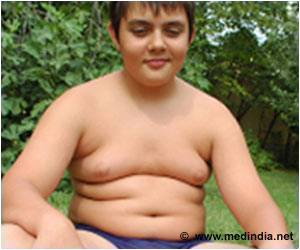
In another study, researchers from the Boston Children' Hospital evaluated the screen media usage among 91 teens and found that television still remains the most often used media and its contribution to obesity is high when compared to computer and video games. Moreover, children who paid high attention to television were bound to watch the advertisements marketing high calorie snacks and those children were found to be obese.
One other study, researcher from the University of Pennsylvania in Philadelphia analyzed the relationship between sleep and bodyweight. 1,390 high school students were followed up for four years and the findings indicate that sleep deprivation leads to increased BMI. Researchers attribute it to increased levels of hunger hormone, which could have led to overeating and weight gain.
The findings of these studies provide practical guidelines for parents to keep their children’s weight under control.
Source-Medindia









